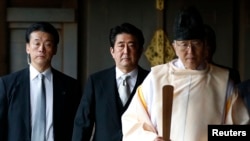Japanese Prime Minister Shinzo Abe has made a controversial visit to a war shrine that many of Japan's neighbors see as a symbol of its militaristic past.
Abe said his early Thursday visit to Tokyo's Yasukuni Shrine was not meant to hurt the feelings of Japan's neighbors, but is a pledge that Tokyo will not go to war again.
China's foreign ministry immediately slammed the move as "absolutely unacceptable to the Chinese people," and demanded Tokyo "reflect on its history of aggression."
Beijing has long maintained that Tokyo has failed to properly atone for its brutal 1930s invasion of large parts of China. It views visits by Japanese leaders to Yasukuni as evidence it has not repented.
Yasukuni honors Japan's nearly 2.5 million war dead, including 14 convicted World War II war criminals. Japanese leaders regularly visit the Tokyo facility, but this will be the first time since 2006 that a sitting prime minister has done so.
Abe, who is known for his hawkish views, has sent ritual offerings to the shrine. He also has said he regrets not visiting during his first term as prime minister, which ended in 2007.
His visit comes exactly one year after he ascended to Japan's top political post. It also came on the sensitive 120th anniversary of the birthday of Mao Zedong, the founder of the People’s Republic of China.
China-Japan ties have also worsened recently because of a bitter dispute over a group of uninhabited islands in the East China Sea.
Abe has accused China of using its rising military power to change the status quo of the Japan-controlled islands. He also plans to increase Japan's defense spending and revise its pacifist constitution to allow for what he calls a "proactive peace policy."
During his visit Thursday, Abe said he hoped to "continue friendly relations" with China as well as South Korea, another victim of Japanese imperialist aggression that regular complains about Yasukuni visits.
Abe said his early Thursday visit to Tokyo's Yasukuni Shrine was not meant to hurt the feelings of Japan's neighbors, but is a pledge that Tokyo will not go to war again.
China's foreign ministry immediately slammed the move as "absolutely unacceptable to the Chinese people," and demanded Tokyo "reflect on its history of aggression."
Beijing has long maintained that Tokyo has failed to properly atone for its brutal 1930s invasion of large parts of China. It views visits by Japanese leaders to Yasukuni as evidence it has not repented.
Yasukuni honors Japan's nearly 2.5 million war dead, including 14 convicted World War II war criminals. Japanese leaders regularly visit the Tokyo facility, but this will be the first time since 2006 that a sitting prime minister has done so.
Abe, who is known for his hawkish views, has sent ritual offerings to the shrine. He also has said he regrets not visiting during his first term as prime minister, which ended in 2007.
His visit comes exactly one year after he ascended to Japan's top political post. It also came on the sensitive 120th anniversary of the birthday of Mao Zedong, the founder of the People’s Republic of China.
China-Japan ties have also worsened recently because of a bitter dispute over a group of uninhabited islands in the East China Sea.
Abe has accused China of using its rising military power to change the status quo of the Japan-controlled islands. He also plans to increase Japan's defense spending and revise its pacifist constitution to allow for what he calls a "proactive peace policy."
During his visit Thursday, Abe said he hoped to "continue friendly relations" with China as well as South Korea, another victim of Japanese imperialist aggression that regular complains about Yasukuni visits.









